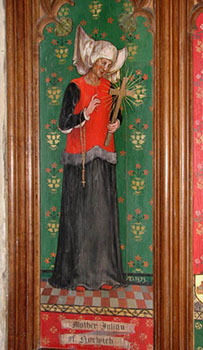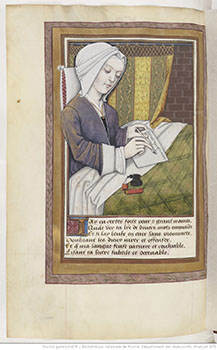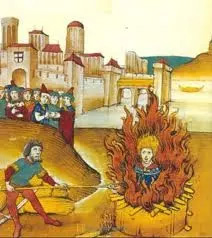For Sunday August 21, 2022
Lectionary Readings (Revised Common Lectionary, Year C)
Jeremiah 1:4–10 or Isaiah 58:9b–14
Psalm 71:1–6 or Psalm 103:1–8
Hebrews 12:18–29
Luke 13:10–17
From Our Archives
Dan Clendenin, Jeremiah on False Hopes, Bad Dreams and Reckless Lies (2007); "He Put His Hands on Her" (2010); Learning to Listen (2016).
Debie Thomas, She Stood Up Straight (2019).
Last week I read a book by Wendy Farley called The Thirst of God (2015). It's about three medieval mystics who answered God's call on their lives despite fierce opposition from a deeply corrupt, strictly hierarchical, and patriarchal church. Forced to the fringes, they critiqued the center, and in doing so they questioned what should be normative or marginal in Christianity.
Mechthild of Magdeburg in Germany, Marguerite Porete in France, and Julian of Norwich in England were all lay women, not clerics or scholars. Much to the exasperation of the political powers and religious authorities, they wrote in the common vernacular for ordinary believers, not in academic Latin. All three of them proclaimed a threatening message to a church that was deeply invested in an angry god — for them God was radically good, loving, and gracious to all humanity.
Early in The Flowing Light of the Godhead (1250–1280), Mechthild wrote that "I was warned against writing this book, and people said, 'if one was not careful, it would be burned on the fire.'" Julian survived the bubonic plagues that decimated three-quarters of the population of Norwich. Then came her sixteen visions, "showings," or "ravings" during a period of sickness when she almost died. She's best remembered for writing the earliest book composed by a woman in English that can be confirmed, A Revelation of Love (c. 1400). As for Marguerite, the church derided her as a "false woman," imprisoned her for eighteen months, declared her a heretic, and then burned her alive in 1310.
For these courageous women, there was no divine call without human conflict. Their sacred vocations brought them terrible struggles, for it's a heavy burden and a preposterous task to bring the words of heaven to earth.
 |
|
Depiction of Julian of Norwich at St. Andrew and St. Mary Church in Norfolk.
|
That's what we see in Jeremiah for this week. He begins his book by describing how God called him to be a prophet to Judah. That call began not only forty years of faithful if reluctant service (627–587 BC), but also forty years of deeply personal struggles. "Oh, that my head were a spring of water / and my eyes a fountain of tears! / I would weep day and night / for the slain of my people."
When you read Jeremiah, said Daniel Berrigan, "you do not find a person looking for inner peace." Rather, God called Jeremiah to speak to the religious and political leaders of his country — their prophets, priests and king. Jeremiah compared Judah's false prophets to the pagan predictors of Baal. Their worship was worse than Samaria, their actions more evil than Sodom.
And what was the national response to his prophetic word? A collective yawn. Nobody listened. Nothing changed. The status quo prevailed. The people despised the man and his message. And so the prophets, observed Berrigan, "press on through a trackless thicket of adverse will," and pay a "hefty price" for their ominous call.
For his faithfulness to God's call, Jeremiah experienced indifference and hatred. He was beaten (20:2), received death threats (26:8), imprisoned (37:15), thrown down a well (38:6), and derided as an unpatriotic crank and traitor. Inner peace? Hardly.
But history proved him right. In 586 BC, Babylon ravaged Judah and Jerusalem, just like Jeremiah had warned, despite all the reckless lies and false comforts of the nation's leaders.
Jeremiah responded to God's call with protests of personal inadequacies. His sense of inadequacy didn't derive from petty problems overcome by cheerful determination, from false modesty, nor was it a mere rhetorical device used by the writer. Jeremiah struggled with God's call on his life, apparent failure, virulent opposition, and with deep discouragement.
 |
|
Mechthild of Magdeburg.
|
His response recalls how Moses protested God's call with a litany of fears — lack of confidence, limited skill, insecurities about personal identity, and fear of rejection (Exodus 3–4); Isaiah's profound sense of personal sin (Isaiah 6); and Jesus's rejection by his hometown Nazareth, the desertion of his closest followers, and feelings of God's abandonment on the cross.
One of my favorite books about our many conflicts with the call of God is The Diary of a Country Priest (1936) by George Bernanos. In the words of the young and earnest priest in Bernanos's novel, "We pay a heavy, very heavy price for the super-human dignity of our calling. The ridiculous is always so near to the sublime. And the world, usually so indulgent to foibles, hates ours instinctively."
The novel is actually a diary that the priest keeps about his ministry. He does so for several reasons — to unburden himself to God, to cultivate a sense of brutal honesty with himself, and to record "the simple trivial secrets of a very ordinary kind of life."
He describes his rural parish as bored and boring, at times petty, and often indifferent. They spread rumors about him. But he loves his people deeply, he prays for them, and he visits every home at least once every three months.
Like Jeremiah, his introspection leads to disillusionment and depression. He clashes with clergy colleagues. He knows that he's physically clumsy and socially awkward. He ponders the absurdity of prayer. He agonizes over his loneliness and sense of isolation. He has a keen sense of history and his own obscure role to play.
When he shares the gospel he sometimes feels like he's merely play-acting and parroting cliches. He compares his restlessness to "a hornet in a bottle." His subsistence diet and meager salary aggravate a chronic sickness that makes him loathe his body.
The young priest admits that he himself is responsible for some of his bitter disappointments. Reflecting upon his "wretched weakness," he struggles with a deep sense of total failure — "my best is nothing." From a merely human perspective, the priest isn't wrong to draw this conclusion.
And so, like Jeremiah and many others, he frets about his call: "Am I where our Lord would have me? Twenty times a day I ask this question."
His elders gave him wise advice: "Keep saying your lessons. Go on with your work. Keep at the little daily things that need doing, til the rest comes. Concentrate. Think of a lad at his homework, trying so hard and his tongue sticking out. That's how our Lord would have us be when he gives us up to our own strength. Little things — they don't look like much, yet they bring peace. Like wild flowers which seem to have no scent, till you get a field full of 'em."
And again: "Keep marching to the end, and try to end up quietly at the roadside without shedding your equipment."
God gave Jeremiah something more than just an exhortation about human perseverance. He promised his divine presence. "Before I formed you in the womb I knew you, before you were born I set you apart; I appointed you a prophet to the nations. So do not be afraid, for I am with you."
 |
|
Marguerite Porete.
|
Believing this promise required the audacity to believe that the Sender knew who he was sending. That his message lived independent of the messenger. That God's presence gave perspective to his problems, and that conflict was not inimical to God's call. Like Moses and Isaiah, Jeremiah learned to acknowledge rather than to deny or even overcome his many inadequacies.
In Marilynne Robinson's novel Gilead, which won the Pulitzer Prize in 2005, the narrator-pastor John Ames ponders a lifetime of following God's call. He reflects upon his accumulation of life experiences and how they wove a rich tapestry whose beautiful texture could only result from many different strands — frailty and failure, memory and mystery, darkness and disappointment, regret and reconciliation, and, weaving it all together, sheer gratitude and joy at how remarkably beautiful the resulting garment of his life nevertheless was.
Near the end of his life, he writes to his son: "I always imagine divine mercy giving us back to ourselves and letting us laugh at what we became, laugh at the preposterous disguises of crouch and squint and limp and lour we all do put on. I enjoy the hope that when we meet [in heaven] I will not be estranged from you by all the oddnesses life has carved into me."
In the end, the medieval mystics, Bernanos's priest, and Robinson's pastor all trusted God's promise to Jeremiah: "Before I formed you in the womb I knew you, before you were born I set you apart and appointed you. Do not be afraid, for I am with you."
Weekly Prayer
Gerard Manley Hopkins (1844–1889)
Thee, God, I come from, to Thee I go
THEE, God, I come from, to thee go,
All day long I like fountain flow
From thy hand out, swayed about
Mote-like in thy mighty glow.What I know of thee I bless,
As acknowledging thy stress
On my being and as seeing
Something of thy holiness.Once I turned from thee and hid,
Bound on what thou hadst forbid;
Sow the wind I would; I sinned:
I repent of what I did.Bad I am, but yet thy child.
Father, be thou reconciled.
Spare thou me, since I see
With thy might that thou art mild.I have life before me still
And thy purpose to fulfil;
Yea a debt to pay thee yet:
Help me, sir, and so I will.But thou bidst, and just thou art,
Me shew mercy from my heart
Towards my brother, every other
Man my mate and counterpart.
Dan Clendenin: dan@journeywithjesus.net
Image credits: (1) Wikipedia.org; (2) Google.com; and (3) Google.com.





